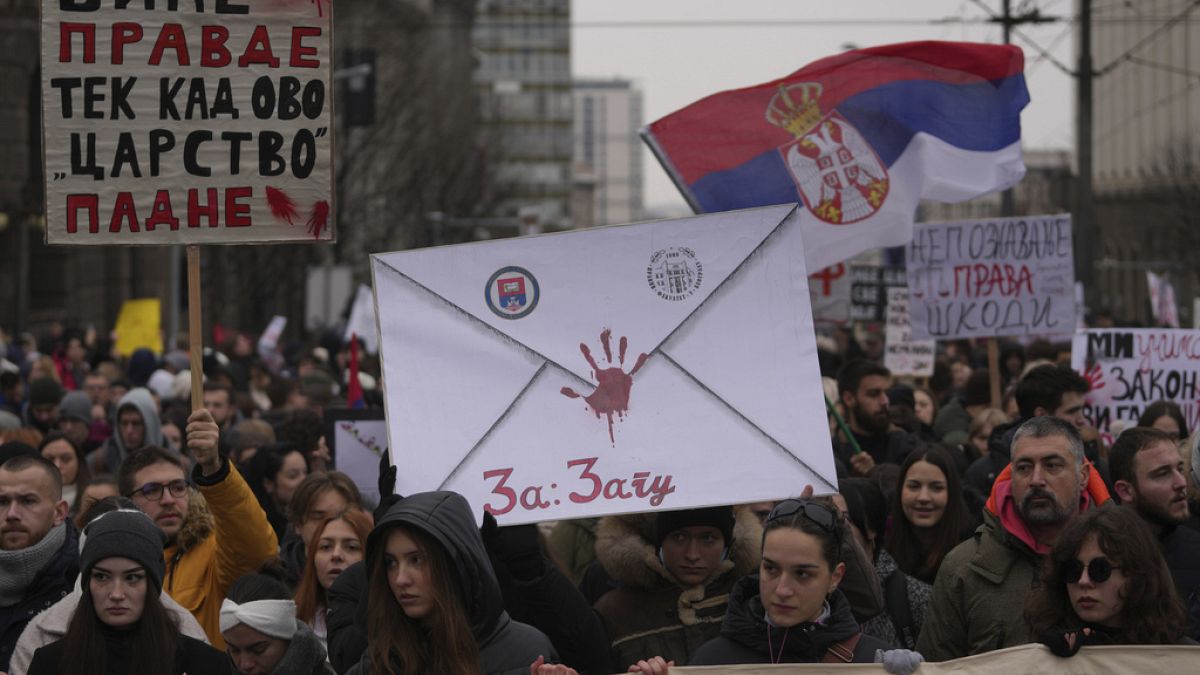Daily street protests demanding accountability for the collapse of a concrete awning at a train station in Novi Sad, Serbia, nearly two months ago, which resulted in the death of 15 people, have been ongoing. University students, citizens, and high school students organized protest actions in several cities across the country, including a commemorative event to honor the victims of the tragedy. The incident occurred on 1 November when a concrete awning collapsed at the recently renovated Novi Sad train station, causing multiple fatalities and severe injuries to others.
Serbian university students have been leaving piles of old school books outside the Education Ministry building as part of the almost daily street protests demanding accountability. Scattered traffic blockades have also been held in various locations throughout Serbia at 11:52 am, the exact time of the tragic incident. These traffic blockades last 15 minutes, symbolizing the 15 victims of the collapse. Many in Serbia attribute the collapse to widespread corruption and poor workmanship on the railway station building in Novi Sad, which had been renovated twice in recent years as part of questionable mega projects involving Chinese state companies.
The persistent protests in Serbia not only reflect the public’s anger over the tragic incident but also highlight broader discontent with the rule of populist President Aleksandar Vučić and his government. Tens of thousands of people participated in a large rally in Belgrade led by university students. Thirteen people, including a government minister, have been arrested in connection with the tragedy. However, the minister’s subsequent release has raised doubts among the public about the transparency and honesty of the investigation. Striking university students have gathered support from various segments of society, challenging the authority and power of Vučić’s government.
The movement’s symbol, a red handprint symbolizing blood on the hands of authorities, has been widely embraced by actors, farmers, and others supporting the protests. The protests have also drawn attention to the issue of corruption and lack of accountability in Serbia, with many calling for justice for the victims and stricter regulations on construction and infrastructure projects. The protests have become a platform for expressing dissatisfaction with the current government and advocating for transparency, accountability, and respect for the rule of law.
The ongoing protests highlight the public’s demand for justice and accountability in the aftermath of the tragic incident in Novi Sad. The demonstrations have brought together people from various backgrounds and professions, united in their call for transparency, honesty, and integrity in the investigation into the collapse. The protests have also put pressure on the government to address issues of corruption and negligence in public infrastructure projects, leading to calls for reforms and stricter regulations. The movement led by university students has become a catalyst for change in Serbia, challenging the status quo and demanding a more accountable and responsive government.
Overall, the protests in Serbia following the collapse of the concrete awning at the train station in Novi Sad have galvanized public support for justice and accountability. The widespread anger and discontent reflected in the demonstrations have exposed underlying issues of corruption and negligence in the country’s infrastructure projects. The persistent calls for transparency and integrity in the investigation have resonated with the public, leading to a broader movement for change and reform. The ongoing protests serve as a powerful reminder of the importance of holding those in power accountable and ensuring that justice is served for the victims of the tragic incident.











